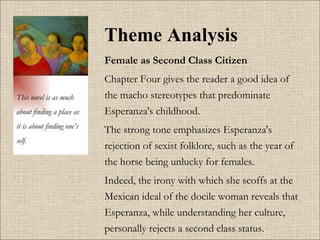
Theme Of Female As Second Class Citizen
- 1. Theme Analysis Female as Second Class Citizen Chapter Four gives the reader a good idea of the macho stereotypes that predominate Esperanza's childhood. The strong tone emphasizes Esperanza's rejection of sexist folklore, such as the year of the horse being unlucky for females. Indeed, the irony with which she scoffs at the Mexican ideal of the docile woman reveals that Esperanza, while understanding her culture, personally rejects a second class status. This novel is as much about finding a place as it is about finding one’s self.
- 2. Theme Analysis Female as Second Class Citizen "She was a horse woman too, born like me in the Chinese year of the horse- which is supposed to be bad luck if you're born female- but I think this is a Chinese lie because the Chinese, like the Mexicans, don't like their women strong“ (10). The strength of Esperanza's tone reveals her confidence in her own convictions, as well as her admiration of her "horse woman“ (10) ancestor's free spirit, much like her own. This novel is as much about finding a place as it is about finding one’s self.
- 3. Theme Analysis Female as Second Class Citizen The metaphor of the horse-woman manifests how such independent female spirits were traditionally meant to be curbed by men. Like a horse indeed, the first Esperanza is locked in a cage of domesticity when "my great-grandfather threw a sack over her head and carried her off” (11). This novel is as much about finding a place as it is about finding one’s self.
- 4. Theme Analysis Female as Second Class Citizen Esperanza's amazement at the legitimacy of male domination is evident in this simile: "Just like that, as if she were a fancy chandelier” (11). This reveals Esperanza's comprehension of the cultural relegation of women to the status of objects, their worth determined by their pleasing appearance and function. This novel is as much about finding a place as it is about finding one’s self.
- 5. Theme Analysis Female as Second Class Citizen Contemplation of the fate of the first Esperanza introduces a recurring metaphor in The House on Mango Street - the woman waiting at the window. The simile "the way so many women sit their sadness on an elbow“ (11) shows how great-grandmother's whole physical and spiritual being was defeated by an unwanted marriage. Instead a head full of thoughts and a mind devising new aspirations, all has been replaced by a despair so heavy it must rest upon her hand. This novel is as much about finding a place as it is about finding one’s self.